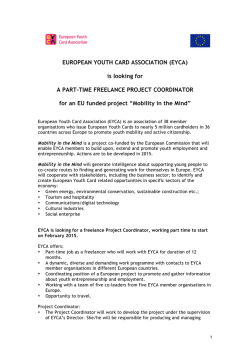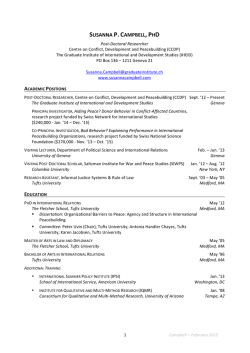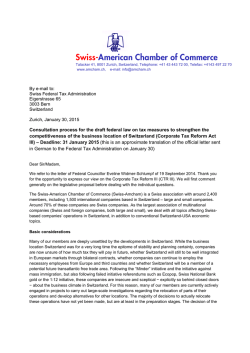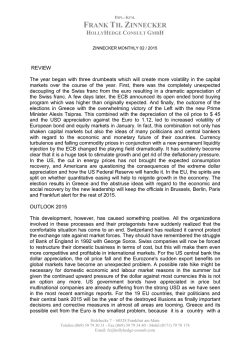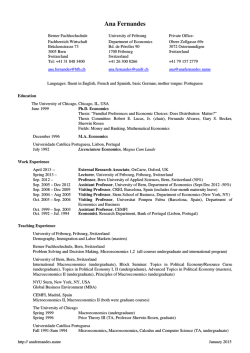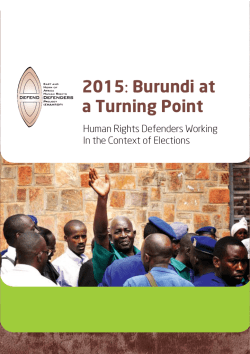
Download PDF
KOFF Newsletter No. 134, February 2015 Human Rights Defenders at Risk KOFF NEWSLETTER No. 134 - february 2015: Human Rights Defenders at Risk 2 Editorial All over the world, human rights defenders (HRDs) are willing to put up with the considerable risks that come with promoting and protecting civil and political rights. Intimidation, blacklisting, imprisonment and even the criminalisation of their actions are merely a few examples of the dangers they are faced with on a daily basis. How can we best ensure their protection? What is the role of Swiss governmental and non-governmental actors? And which protective mechanisms are being taken at the level of international policy? The first newsletter of 2015 provides an overview over the current situation and the daily challenges HRDs are confronted with in many of the world’s regions, such as Guatemala, the Democratic Republic of the Congo and Afghanistan. It also presents the various projects carried out by Swiss state and non-state actors as well as the various policy instruments available to respond to this problem. Marie Seidel Editor Table of Contents focus >> Focusing on Human Rights – The Challenge of the 21st Century report >> KOFF: Creating Scope for Civil Society Action 3 NEWS >> artasfoundation – Peacebuilding through Art 9 >> MAS in Peace & Conflict Transformation 9 >> International Partner Organisations 10 4 >> Defenders of Women’s Rights Campaign for Peace and Rights 5 publications >> 10th Anniversary of EU Guidelines on Human Rights Defenders 11 >> SDC: Committed to Supporting Human Rights Defenders 5 >> Can Mediation Do Harm? >> Business and Human Rights – Switzerland’s Commitment 6 WEB TIP >> What Next After the Millennium Development Goals? 11 >> When The State is Unable to Protect its Civilian Population 7 >> Defending Human Rights through Information 7 >> miva: Providing Transport – Supporting Human Rights 8 >> Peacemakers Are also Human Rights Defenders 8 11 CALENDAR >> Upcoming Events Publisher: Centre for Peacebuilding KOFF Sonnenbergstrasse 17 CH - 3000 Bern 7 Tel: +41 (0)31 330 12 12 www.koff.ch 12 KOFF Kompetenzzentrum Friedensförderung Centre pour la promotion de la paix Centre for Peacebuilding focus 3 Focusing on Human Rights – The Challenge of the 21st Century The International Platform against Impunity in Guatemala is a lobbying platform established by European non-governmental organisations (NGOs) which campaigns locally for the protection of human rights defenders (HRDs). Anabella Sibrián, who runs the platform, reports on the situation for HRDs in Guatemala and her cooperation with representatives of the international community. International Platform against Impunity in Guatemala Anabella Sibrián Links Peace Brigades International Switzerland Peace Watch Switzerland Unit for the Protection of Human Rights Defenders in Guatemala (Udefegua) Defending human rights in Guatemala is a risky business. In 2013 alone, there were 657 confirmed reports of assaults on men and women involved in this area – 46% more than in the previous year. The trend continued in 2014, with over 800 assaults reported. The most common victims of attacks in 2014 were people who were defending the right to a healthy environment or the rights of farmers and the indigenous population. In a comprehensive analysis of the pattern behind these assaults, the HRDs highlighted the criminalisation of their activities as one of the most common ways of restricting their freedom to defend human rights. This criminalisation, along with public stigmatisation, makes them the target of attacks. In light of this, the HRDs set up the Alliance against Criminalisation (AFC) with the aim of guaranteeing a systematic follow-up process after the annual meeting between the HRDs and diplomatic missions. This was not the first time that an initiative of this kind between national and international representatives had been called for, but it was the first to be led by actors from rural communities and LGBTI groups. The first thing the AFC did was approach the Embassy of the European Union (EU) and the Grupo Filtro, a group of European embassies which monitors the situation of HRDs in Guatemala. With the support of these two bodies, four meetings were held in 2014 involving ambassadors from the EU, Switzerland and Norway as well as the Office of the UN High Commissioner for Human Rights and HRDs from remote parts of the country. During these meetings, the HRDs presented statistical data, witness testimonies, documents and a detailed analysis of their experiences of dialogue processes with the authorities. These resources helped the HRDs to show how much the pressure on them and their communities had been increased in an attempt to crush any resistance against major projects that were threatening their livelihood. The HRDs argued that, rather than heeding their warnings, the Guatemalan government was favouring investments in risky situations while incriminating those who attempt to defend human rights and bringing them before the courts. HRDs face illegal and arbitrary arrests and are publicly discredited as campaigners against development who are being manipulated by foreigners. This increases their risk of falling victim to psychological and physical attacks, which usually go unpunished. The question now is how can HRDs be provided with better protection under these circumstances? With this in mind, the Guatemalan government set up an agency in 2007 to analyse attacks on HRDs, involving the public prosecution service, the presidential human rights commission, national and international civil society organisations and – in an observational capacity – the Office of the UN High Commissioner for Human Rights. The agency provided an important platform for discussion and played a valuable role in analysing and investigating patterns behind the various types of assaults on HRDs between 2008 and 2012. Afterwards, however, it veered away from its primary function and thus lost any opportunity to bring about change. As a result, the civil society organisations which had supported the creation of the agency and taken part in it from the start lost confidence and withdrew from any involvement in early 2013. Nevertheless, at international level, the Guatemalan government still continues to present the agency as evidence of its political will to protect human rights defenders – even though the HRDs had even gone as KOFF NEWSLETTER No. 134 Human Rights Defenders at Risk 4 far as pointing out to the Inter-American Commission on Human Rights just how far removed the agency now was from its original purpose. Given the fragile conditions and the weakness of local institutions responsible for protecting HRDs, the involvement of the international community in a supporting and observing role is essential. “We want the ambassadors to know what is happening in our communities so that they understand that the conflicts are caused by the human rights violations we are subjected to, and we want them to listen to us.” HRDs operating in Guatemala contacted the International Platform against Impunity in Guatemala in February 2014 with this request, and with the backing of two international NGOs running support programmes for HRDs in the country. They asked the diplomatic missions for public support and the effective implementation of the guidelines on the protection of human rights defenders. The EU, Norway and Switzerland developed these guidelines for universal use, to serve as a framework for action based on international law and the relevant agreements. This year, aside from their activities as part of the Grupo Filtro, several embassies have visited the HRDs in their village communities, observed court cases and provided financial aid in difficult situations. One HRD regarded it as a success that the problem of criminalising people who defend their land against environmental damage is being addressed in the dialogue with the embassies. Meanwhile, the ambassador for the EU has declared that “the EU is committed to focusing on human rights in its relations with other countries and promoting them in every area of foreign policy, including in matters relating to trade, investments, technology, the Internet, the environment, corporate responsibility and development policy”. Placing human rights at the heart of international relations, including trade and investments, is one of the most important challenges facing the global community in the 21st century. If it is dealt with successfully, it will bring an end to the criminalisation of human rights defenders. report KOFF: Creating Scope for Civil Society Action KOFF Anna Leissing Links Implementation of the Swiss Guidelines on the Protection of Human Rights Defenders. KOFF Essential Challenges for Human Rights Defenders: Reflections from Nepal. KOFF Critical Reflection Swiss Guidelines on the Protection of Human Rights Defenders KOFF NEWSLETTER No. 134 An active peace policy both requires and creates scope for civil society action. Various concerns need to be expressed and dealt with in inclusive processes in order to bring about social and political change and thus ensure a just and peaceful society. However, a global trend shows that this scope for action is becoming increasingly restricted, which has a direct impact on human rights defenders (HRDs) whose work involves advocating their own interests and the concerns of others. They are falling victim to threats, vilification, arbitrary arrests and criminal convictions, torture and targeted killings. Helping to protect HRDs and thus create scope for civil society action is also the responsibility of peacebuilding. With this in mind, the Centre for Peacebuilding (KOFF) organised a conference in June 2014, providing a platform for HRDs, representatives of the Swiss federal administration and civil society organisations to discuss the situation for human rights defenders in Guatemala, Honduras, Russia, Serbia and Sri Lanka, and to come up with context-specific recommendations for implementing the Swiss Guidelines on the Protection of Human Rights Defenders. Two KOFF roundtables offered the opportunity for a similar dialogue on the situation for HRDs in Nepal and Columbia. During these discussions, it emerged that safe Human Rights Defenders at Risk 5 forums for shared analyses, exchange and cooperation between all relevant actors are a crucial element in the effort to improve the protection of human rights defenders. Defenders of Women’s Rights Campaign for Peace and Rights KOFF Annemarie Sancar Links KOFF: Gender & Peacebuilding International Civil Society Action Network ICAN, 3rd International Forum Resolution of the 2014 ICAN Forum In November 2014, participants gathered in Turkey for the International Civil Society Action Network (ICAN) Forum, which is partly funded by the Human Security Division of the FDFA. The event was attended by 60 representatives of women’s rights organisations and local civil society groups from 13 countries across North Africa, Asia and the Middle East, who discussed the impact of militarism and extremism on civil society, and particularly on women and children. The Centre for Peacebuilding (KOFF) was also involved in the dialogue. With their varying backgrounds, biographies and experiences, the participants offered an impressively wide range of perspectives. After a few hours of open debate, they managed to agree on a resolution against the international policy of deploying bombs and drones – a policy which benefits the arms industry but does nothing to promote the right to education and the right of women to get involved in social processes. This campaign against a culture of violence is a delicate balancing act. Thanks to networking and solidarity, its proponents are able to reach out to the public with important statements, often overstepping the boundaries of their designated scope for action, which brings with it certain risks. Local women’s rights organisations have also proved to be reliable partners for Swiss non-governmental organisations in providing the support needed in the field, as they are familiar with the everyday lives of the local women, are well established in the local community and act with courage. For their parts, platforms for building networks and sharing experiences such as ICAN or KOFF offer important peacebuilding resources for these local organisations. SDC: Committed to Supporting Human Rights Defenders SDC Simone Troller Links Swiss Guidelines on the Protection of Human Rights Defenders KOFF NEWSLETTER No. 134 Human rights defenders (HRDs) advocate for the rights of individuals and groups, and thus play an essential role in strengthening the rule of law – a fact that is reflected in the Swiss Guidelines on the Protection of Human Rights Defenders. The Swiss Agency for Development and Cooperation (SDC), part of Switzerland’s Federal Department of Foreign Affairs (FDFA), contributes to the realisation of these guide- lines in its partner countries – such as Honduras or Afghanistan, for example – through specific projects. SDC has been assisting Peace Watch Switzerland and Peace Brigades International in their efforts to support HRDs in Honduras since 2013. This contribution forms part of a strategy aimed at preventing violence and reinforcing human rights Human Rights Defenders at Risk 6 Peace Watch Switzerland in Honduras Peace Brigades International in Honduras Afghanistan Independent Human Rights Commission Tawanmandi project EU+ Local Strategy for Human Right Defenders in Afghanistan 2014 and the rule of law as both a prerequisite for and an objective of poverty reduction in a country with the highest homicide rate in the world. Physical protection is provided for human rights lawyers and high-profile representatives of the groups concerned, either directly by or in cooperation with local institutions. SDC’s activities in Honduras also include support for security sector reform and for the opening of a country office by the United Nations Office of the High Commissioner for Human Rights. SDC has been active in promoting human rights in Afghanistan for more than a decade. The Agency participated in the development of a local strategy for donor countries to protect human rights defenders and has joined the European Union, Canada and Norway in implementing this initiative. SDC’s involvement forms part of a broader strategy, which includes support to the Afghanistan Independent Human Rights Commission and the Afghan Ministry of Justice, as well as the strengthening of civil society organisations on human rights through the Tawanmandi project. This project aims to build the capacity of civil society and increase its leverage on Afghan politics and institutions. Business and Human Rights – Switzerland’s Commitment Human Security Division of the FDFA Daniel Ruz Trainee - section for Human Rights Policy Links Switzerland’s Human Rights Policy Commitment – Human Rights Defenders Pages 28/29 of the UN Working Group’s Guidance on National Action Plans Numerous organisations as well as the UN Special Rapporteur on Human Rights Defenders have recently drawn attention to the problems encountered by human rights defenders (HRDs) who work within the field of business and human rights. Activists who criticise business activities, frequently in connection with the extractive industry or megaprojects in the energy sector because of their negative impacts on the human rights situation of the local population often face serious challenges such as threats or intimidation. According to the United Nations Guiding Principles on Business and Human Rights (UNGPs), a State must respect, protect and fulfil human rights, and business enterprises are required to respect them. The UNGPs also emphasise the need for appropriate and effective remedies in case of human rights violations. Despite this, many HRDs all over the world are subject to oppression, threats or criminalisation when opposing the negative consequences of business activities. Although it is the States’ duty to protect HRDs, there are still too many countries in which state laws or actions interfere with their activities. Examples include restrictions on free speech and freedom of assembly, arbitrary detention or harassment by law enforcement officials. Through their actions and their commitment, HRDs play a key role in protecting and promoting human rights as well as in strengthening the rule of law. Protecting them is therefore a priority for the Swiss Federal Department of Foreign Affairs (FDFA). In 2013, Switzerland published its “Guidelines on the Protection of Human Rights Defenders”, which provides Swiss representations abroad with a reference for good practice and courses of action for protecting HRDs. Moreover, Switzerland is working on a national strategy to implement the UNGPs at state level, which will establish measures and enable the Swiss government to make a clear statement regarding its human rights expectations towards Swiss companies operating abroad; this will contribute to improving the situation of HRDs. KOFF NEWSLETTER No. 134 Human Rights Defenders at Risk 7 When The State is Unable to Protect its Civilian Population Caritas Switzerland Ira Amin Programme Manager for Colombia Link How Caritas Switzerland supports human rights Caritas Switzerland is committed to helping to protect human rights defenders (HRDs) in Colombia. Through a programme which ran until 2014, it gave HRDs in Colombia who were under serious threat the chance to escape from high-risk areas and continue their work remotely until the situation had calmed down. This protection scheme also involved reuniting families, arranging access to healthcare and education, and offering accompanying measures to provide psychosocial support and further training. This programme was set up at a time when HRDs in leading positions in Colombia were being targeted for murder. Humanitarian organisations such as the International Committee of the Red Cross, the UN High Commission for Refugees and the Swedish Embassy were looking for effective ways to provide protection, which could not be guaranteed by the State. Caritas Switzerland found a valuable partner in the form of the Colombian Church. In their dedication to upholding human rights, peacebuilding and protecting HRDs, local religious associations have proved themselves to be credible actors and have earned a high level of respect amongst the population. In addition, they maintain a particularly active presence in rural communities, where illegal armed groups operate and increase the threat of danger. In spite of the resumed peace negotiations, which have been ongoing since 2012, the protection of HRDs is still a current issue. Since the Colombian government is conducting negotiations with the guerrilla group FARC-EP without a ceasefire, HRDs are faced with the important task of highlighting existing human rights violations and thus helping to establish lasting peace in Colombia. Defending Human Rights through Information Fondation Hirondelle Denis Faroud Links Fondation Hirondelle Caddy Adzuba The Democratic Republic of the Congo is a war-torn country. While the conflicts are contained to the borders with Uganda, Rwanda, Burundi and Tanzania in the country’s east, a country that witnesses murder and rape as weapons of war on a daily basis and is confronted with its journalists being killed, one of which very recently, is indeed a country torn by war. It is no coincidence that this country has had the largest number of United Nations (UN) peacekeepers supporting the regular armed forces for the past 15 years. Despite the deployment of 25,000 men and women, a large majority of which are blue helmets, the results are mixed, as mentioned by Ban Ki-moon, Secretary-General of the UN, last month. There are many people on-site who are trying to limit the impact this war has on local population (UN agencies, NGOs, Western organisations, journalist associations, etc.), and sometimes they even put their lives at risk for those who are in the field. For the past 13 years, Fondation Hirondelle has been putting its journalistic know-how to use with Radio Okapi, which has already seen two of its reporters killed. The Foundation also helps repatriate journalists who have been threatened during their work, like Caddy Adzuba, who received death threats in 2009 and was recently awarded the Spanish Prince of Asturias Award for her fight against sexual KOFF NEWSLETTER No. 134 Human Rights Defenders at Risk 8 violence against women in South Kivu. In this regard, the Foundation is currently assessing the feasibility of an index which measures impunity for sexual crimes. This way, it is committed to defending human rights through the spread of information but also to protecting those who defend these rights. And there are more than you would suspect: in Kinshasa, the attacks of 7 January in Paris prompted a surprising number of protests. miva: Providing Transport – Supporting Human Rights miva Switzerland Gabriella Wiss Director Links miva Project in the Democratic Republic of Congo During the war in the Democratic Republic of Congo, serious crimes were committed against the civilian population in the Archdiocese of Bukavu, part of the South Kivu province. Social peace was left permanently damaged, while the traumas of war and domestic violence are evident everywhere and disputes over land rights and land theft rage on in rural areas. In this difficult environment scarred by human rights violations, the “Justice et Paix” (“Justice and Peace”) commission of the Archdiocese of Bukavu (CDJP), which was set up in 1988, has been campaigning for peace, justice and the defence of human rights in healthcare, society and the legal system. Its mission is to raise people’s awareness with regard to human rights issues and to assist them in combatting the injustices they face in their daily life. The CDJP informs members of the local population about their rights and duties as citizens and provides them with social and legal support when it comes to asserting or defending their rights and freedom. The commission is also involved in offering consultations and medical aid to victims of torture and rape. The organisation operates in all 37 parishes of the Archdiocese of Bukavu, so mobility is absolutely essential for its work. miva Switzerland stepped in to help with this by raising funds for a new vehicle to replace the CDJP’s old one, which had been heavily used and was no longer fit to drive. Peacemakers Are also Human Rights Defenders APRED Christophe Barbey Link APRED KOFF NEWSLETTER No. 134 The creation, protection and advancement of fundamental rights is the work of many actors. Human rights defenders (HRDs) are some of the most essential ones, even if they do not always claim this defenders title. They bring awareness about the need for these rights and for their protection. The victims of the disaster in Bhopal highlight the need for rights to a healthy environment, the ones of the Rana Plaza advocate for workers rights, the activists working for an unconditional basic income promote the right to subsistence and social workers all over the world enhance the right to dignity. It is because these people are living and sometimes defending these rights that these rights are acknowledged, legalised and protected. In this context, the human right to peace brings new elements. As an individual right to peace and security, it does not only concern the State and international relations, it reaches to all the relationships formed throughout life and at all levels Human Rights Defenders at Risk 9 of society. It also adds a functional dimension – peace – to the management of rights and to conflict handling; both should be done peacefully. The human right to peace thus provides not only more protection for HRDs and peacemakers, it gives them new tools and better settings to enforce and advance the rights they support: our rights. NEWS artasfoundation – Peacebuilding through Art artasfoundation Dagmar Reichert Marcel Bleuler artasfoundation, the Swiss Foundation for Art in Regions of Conflict, has recently joined the Centre for Peacebuilding (KOFF). It is an independent and impartial nonprofit organisation based in Zurich. Established in 2011, the foundation aims to help promote peace through art by following a threefold approach: Link First of all, artasfoundation initiates art projects as part of the reconstruction process in the aftermath of armed conflicts. Since it was established, for example, it has implemented several film, dance, music, art and theatre projects in the South Caucasus – especially in Georgia and its breakaway regions – and is in the process of expanding its activities into Southeast Asia. In its attempts to open up new horizons through art and play an active part in developing a public sphere, it places particular emphasis on personal exchange and interaction, often involving Swiss artists. artasfoundation Secondly, the foundation investigates ways in which art can play a supporting role in the context of mediation processes and negotiations. It endeavours to broaden the range of tools available to mediators by bringing in its own communication methods and content. To this end, the foundation has also been collaborating with other organisations, such as the Centre for Humanitarian Dialogue in Geneva. These two aspects of the foundation’s work are brought together and critically examined as part of a third line of activity. artasfoundation hopes that joining KOFF will boost its networking activities and give it the opportunity to step up its work with other organisations. It is keen to enhance existing peacebuilding initiatives by introducing creative approaches and working methods and to expand its own projects by linking up with complementary initiatives. artasfoundation relies on donations from numerous members of civil society and project grants from the Swiss federal government to fund its activities. As an operating foundation, it does not accept applications for funding. Its Board and Advisory Board are made up of notable figures from various fields of art and diplomacy. MAS in Peace & Conflict Transformation swisspeace Franziska Sigrist KOFF NEWSLETTER No. 134 The Master of Advanced Studies (MAS) in Peace & Conflict Transformation programme, offered by swisspeace and the University of Basel, provides a holistic understanding of civilian peacebuilding aimed at transforming violent conflict by peaceful means, promoting peace, rebuilding societies affected by war and Human Rights Defenders at Risk 10 Link MAS in Peace & Conflict Transformation preventing violence from re-erupting. Drawing on current academic findings and latest insights from peacebuilding practice, this MAS enables participants to critically reflect on and engage in peacebuilding. Topics covered include fragility, conflict & statebuilding; gender equality & peacebuilding; dealing with the past; business, conflict & peace; conflict prevention & early warning; national dialogue & peace mediation; peacebuilding methodologies and topical conflict cases. The modular structure, consisting of elective courses embedded in a common framework permits participants to specialise in topics of their choice and complete the modules within an individually tailored timeframe over a period of one up to five years. International Partner Organisations News from the international peacebuilding scene and KOFF partner organisations Berghof Foundation CDA Collaborative Learning Projects Conciliation Resources EIP EPLO forumZFD FriEnt Geneva Peacebuilding Platform GIZ GPPAC Foundation International Alert Plattform Zivile Konfliktbearbeitung KOFF NEWSLETTER No. 134 CDA Collaborative Learning Projects CDA will be facilitating the training “Practical Tools for Promoting Positive Change in Complex Contexts“ in collaboration with the Barcelona International Peace Resource Center (BIPRC). This training (June 15-18, 2015) is a 4-day introductory course that combines lessons learned and practical tools from two of CDA’s collaborative learning programmes: Do No Harm (DNH) and Reflecting on Peace Practice (RPP). DNH is CDA’s original toolkit for ensuring the conflict sensitivity of all international interventions. RPP supports practitioners and policy makers to take effective action and apply strategic thinking at all stages of peace programming. This training offers an introduction to each, demonstrating the complementarity and application of the tools and analytical processes. The course includes opportunities to practice using what you have learned. It is well suited for those whose work relates to both peacebuilding and conflict sensitivity, and for busy professionals seeking a single introduction to both RPP and DNH. 100th issue of the “FriEnt-Impulse” newsletter The lead article of the latest newsletter from German group FriEnt was written by the German Development Institute (DIE). It suggests we draw the lessons from 2014’s significant events before setting the main challenges to be overcome in 2015. The crisis in Ukraine has reminded us that peace in Europe cannot be taken for granted, and that peace can only be promoted efficiently on a global scale and between nation states, in and with the societies threatened by conflicts but also in Western societies whose economic and political impact reaches well beyond state borders. The year 2015 offers a chance to set the course for a better architecture of peace, particularly within the framework of the post-2015 development agenda and goal 16 which includes the promotion of “peaceful and inclusive societies for sustainable development”. The FriEnt team has posted an article in response to the publication of the Secretary-General’s synthesis report, which reaffirms the 17 goals defined by the Working Group while proposing to reorganise them into a set of six key elements in order to make them known on a global scale and to ensure their implementation at country level – an important aspect for the future of goal 16. Human Rights Defenders at Risk publications 11 10th Anniversary of EU Guidelines on Human Rights Defenders Link Peace Brigades International 2014: Ten Years of the European Union Guidelines on Human Rights Defenders. An Assessment from the Field. Ten years ago, the Council of the European Union adopted the Guidelines on Human Rights Defenders (HRDs). Various organisations have been involved in implementing these guidelines, including Peace Brigades International (PBI). In May 2014, it published a report on the situation for the HRDs it supports in Mexico, Guatemala, Honduras, Colombia and Kenya. This document, which is based on an extensive number of interviews with HRDs and members of the diplomatic corps in each country, examines the successes achieved in putting the guidelines into practice and the challenges still to be tackled. Can Mediation Do Harm? Link Sara Hellmüller, Corinne von Burg, Mathias Zeller: Can Mediation Do Harm? Conflict Sensitivity in International Peace Negotiations. swisspeace Essential 04/2014 While the concept of conflict sensitivity is now widely accepted in the field of development aid, it remains widely neglected in international peace mediation. It is often assumed that mediation has a positive impact on a conflict, but this view ignores the fact that it can exacerbate conflicts too – as was the case in the Democratic Republic of Congo in 2002/2003, for example. In its latest Essential, swisspeace presents a three-step model for conflict-sensitive mediation which is designed to avoid doing unintentional harm and to increase its positive impact. WEB TIP What Next After the Millennium Development Goals? Link Sustainable Development Knowledge Platform KOFF NEWSLETTER No. 134 Next year marks the deadline for achieving the Millennium Development Goals (MDG) set in 2000 and it is time to pay attention to what should be on the United Nations’ post-2015 development agenda. In June 2012, “Rio +20” – the follow-up event to the United Nations Conference on Environment and Development – took place in Rio de Janeiro. One of the key outcomes from this event was the formation of an open working group tasked with drawing up a list of sustainable development goals (SDG). Some of the 30 places on this team are held jointly by several states. Switzerland, for example, shares its place with Germany and France. A total of 13 sessions have been held over the past two years and 17 proposals for sustainable development goals from 2015 onwards were published in June 2014. The Sustainable Development Knowledge Platform offers an overview of the individual steps taken by this working group. Numerous documents detailing the individual sessions can be downloaded from the website, as well as the Open Working Group proposal for Sustainable Development Goals and the synthesis report by the UN Secretary-General on the post-2015 agenda. A calendar of events showing the most important steps to come is also available to view. Human Rights Defenders at Risk CALENDAR 12 Upcoming Events Until 11 February 2015 PeaceNexus is launching its second organisational development call for proposals. Through small grants and process support, PN seeks to enable peacebuilding NGOs to better manage their organisational change, growth and learning processes. The call is open to NGOs with an explicit peacebuilding mandate that operate internationally (in at least 5 countries) and to local organisations operating in West Africa and the Balkans. Further information. Until 13 February 2015 What is life like for people living in Sri Lanka, more than five years after the end of the civil war? Until 13 February 2015, Palmyrah is exhibiting photographs by Walter Keller at the parish house in Zollikofen (Bern, Switzerland) and offering us an insight into this country devastated by over thirty years of conflict. Further information. 7, 14 and 25 February 2015 In February, Peace Brigades International (PBI) and Peace Watch Switzerland (PWS) are organising three information sessions in Zurich (7th), Bern (14th) and Lausanne (25th), enabling visitors to learn more about opportunities to support human rights in their projects, as in Switzerland. These provide a chance to find out more about the work done by volunteers on the ground, the training process and the workings of the organisations. Further information is available from PBI and PWS, you can also contact PBI or PWS. 26 February 2015 In Sri Lanka, the local population is yet to feel the benefits of the country’s booming tourist industry. A conference organised in Bern by the Society for Threatened Peoples aims to kick off the debate on the effects of tourism and human rights in Sri Lanka, with contributions from local organisations and a representative from Swiss travel agency Kuoni. Further information and contact. 2 - 11 March 2015 Fragile states have become an issue of major concern for the international community. swisspeace hold a Course on Fragility, Conflict & Statebuilding (CAS), designed for practitioners and academics, that focuses on the conceptual, policy and implementation challenges of statebuilding in fragile and conflict-affected contexts. Further information and registration. 13 - 17 April 2015 Violent conflict has a profound impact on gender relations and contests accepted gender roles, providing space for transformative action for gender equality in postconflict reconstruction. This postgraduate course reflects on methodologies for understanding gender dimensions of conflict and the impact of peacebuilding on gender relations; key issues for post-conflict transformation of gender relations in economic, social, legal and political spheres; the role of women’s agency, women’s rights, masculinities and the implication of gender stereotypes in conflict and peacebuilding. Further information and registration. 16 - 19 April and 7 - 10 May 2015 Have you ever wanted to go on assignment as a human rights observer? Peace Watch Switzerland (PWS) trains and sends volunteers on assignments with a minimum term of three months. The forthcoming training days dedicated to assignments in Latin America are set to take place on 16-19 April and 7-10 May 2015 in Zofingen (Switzerland). Participants must be at least 23 or 25 years of age (depending on the assignment), and be able to speak Spanish to a good level. The deadline for registration is 2 April 2015. Further information and contact. 23 - 30 May 2015 From 23 to 30 May, the Institute for Conflict Transformation and Peacebuilding (ICP) and mediatEUr are organising an advanced peace mediation course. Gathering in Belgrade, the participants will have the opportunity to learn more about the latest developments in the field, think about peace mediation as a community of specialists and identify the next challenges to be conquered in terms of peace mediation. Further information. KOFF NEWSLETTER No. 134 Human Rights Defenders at Risk 13 20 - 25 July 2015 ICP is organising its eighth “International Summer Academy and Forum”, dedicated this year to peace mediation and national dialogue. Particular emphasis will be placed on the current situation in North Africa and the Sahel, as well as on the theoretical and practical aspects of the peace mediation process and national dialogue. Further information. KOFF calendar On the KOFF website you can find more information about upcoming roundtables and events organised by KOFF. KOFF Kompetenzzentrum Friedensförderung Centre pour la promotion de la paix Centre for Peacebuilding Publisher KOFF of swisspeace Contact Sonnenbergstr. 17 P.O. Box, CH-3000 Bern 7 Phone : +41 (0)31 330 12 12 Editing Marie Seidel, Lorenz Häberli Layout Liliana Rossier Translation Furrer Übersetzungen Übersetzergruppe Zürich Cover “Community in resistance”, La Puya, Guatemala Copyright: Anna Leissing, swisspeace KOFF is a project of swisspeace. It is jointly supported by the Swiss Federal Department of Foreign Affairs (FDFA) and the following swiss NGOs which are members of the platfom: Alliance Sud APRED artasfoundation BAHA’I Brücke · Le pont Caritas Switzerland Caux - Initiatives of Change cfd DCAF Eirene Switzerland Fondation Hirondelle Geneva Call Grains of Peace Green Cross Switzerland GSoA HELVETAS Swiss Intercooperation HEKS Institute for Conflict Transformation and Peacebuilding Interpeace Lucerne Initiative for Peace and Security (LIPS) Media21 Medico International Switzerland Medienhilfe mission 21 MIR-Switzerland miva Suisse - transporte l’aide Palmyrah Peace Brigades International Peace Watch Switzerland PeaceWomen Across the Globe Pestalozzi Children’s Foundation Quaker United Nations Office Schweizerischer Katholischer Frauenbund SCI Switzerland Society for Threatened Peoples Switzerland Solidar Switzerland SOS Children’s Villages Swiss Academy for Development Swissaid Swiss Catholic Lenten Fund Swiss Peace Council Swiss Red Cross Swiss Refugee Council Terre des Femmes Switzerland Terre des hommes Switzerland TRIAL Women for Peace Switzerland World Vision Switzerland Previous issues available online KOFF NEWSLETTER No. 134 Human Rights Defenders at Risk
© Copyright 2026
